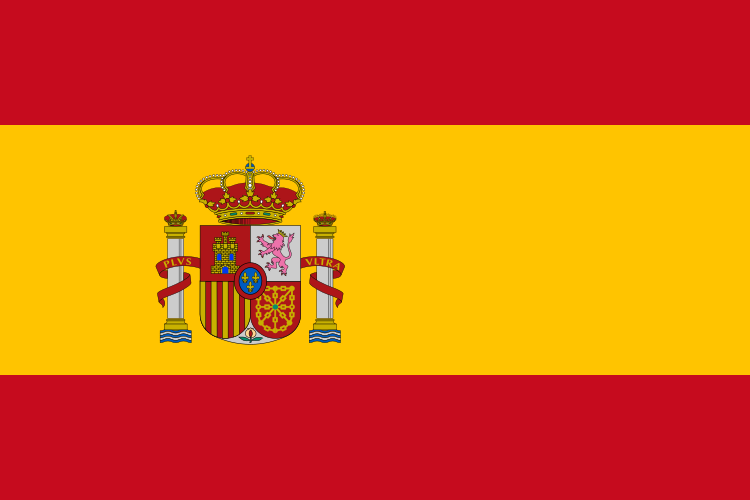Congenital Hypothyroidism
January 20, 2023
Posted by
Dr. Jed McKinlay in
Foal and Neonate Care
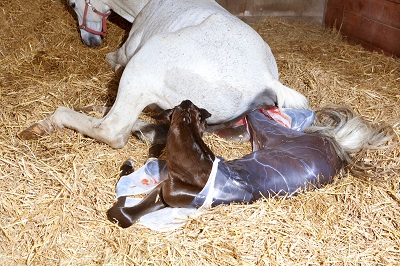 Congenital Hypothyroidism is a disease syndrome or process that is native to the Northwest Region of the United States. Dr. Jed McKinlay of McKinlay & Peters Equine Hospital in Colbert, WA wishes for us to share their firsthand knowledge about this issue because there is little documentation to be found. Though it has been observed in the field, it has never been repeated in clinical research. However, a number of risk factors have been identified; dos and don’ts to evade this problem. (Warning! An image in this article may be disturbing to some readers.)
Congenital Hypothyroidism is a disease syndrome or process that is native to the Northwest Region of the United States. Dr. Jed McKinlay of McKinlay & Peters Equine Hospital in Colbert, WA wishes for us to share their firsthand knowledge about this issue because there is little documentation to be found. Though it has been observed in the field, it has never been repeated in clinical research. However, a number of risk factors have been identified; dos and don’ts to evade this problem. (Warning! An image in this article may be disturbing to some readers.)
Care of the Newborn Foal
January 05, 2018
Posted by
Dr. Dave Scofield in
Foal and Neonate Care
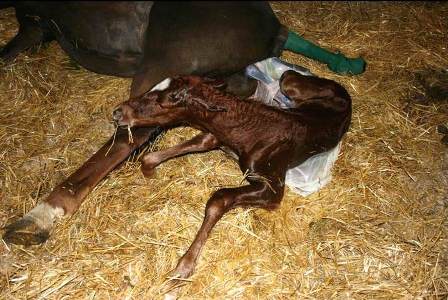 What transpires in the first 24 to 48 hours of a foal’s life is critical to his health and well-being from early life and up through weaning. As a foaling attendant there are several “milestones” to keep in mind as you watch the behavior of both the baby and the mare post-foaling. In this article we discuss the milestones they both should make within the few hours after the foal’s arrival into his new world. The care delivered, attention to detail, and respect for the nature of the horse will help set up your foal up for a healthier adolescence.
What transpires in the first 24 to 48 hours of a foal’s life is critical to his health and well-being from early life and up through weaning. As a foaling attendant there are several “milestones” to keep in mind as you watch the behavior of both the baby and the mare post-foaling. In this article we discuss the milestones they both should make within the few hours after the foal’s arrival into his new world. The care delivered, attention to detail, and respect for the nature of the horse will help set up your foal up for a healthier adolescence.
The Orphan Foal - How to Achieve a Positive Outcome
March 05, 2017
Posted by
SBS in
Foal and Neonate Care
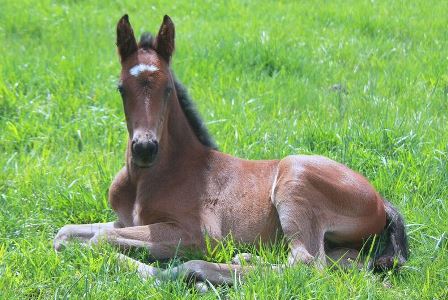 What will you do in the event you are left to manage an orphaned foal? No one wants to think about such a scenario but it's best to consider all possible outcomes so you are prepared if the unthinkable happens. This includes knowing how to provide the orphaned foal with colostrum, locate a nurse mare, etc.
What will you do in the event you are left to manage an orphaned foal? No one wants to think about such a scenario but it's best to consider all possible outcomes so you are prepared if the unthinkable happens. This includes knowing how to provide the orphaned foal with colostrum, locate a nurse mare, etc.
Grafting an Orphaned Foal onto a Lactation Induced Recipient Mare
April 28, 2016
Posted by
SBS in
Foal and Neonate Care
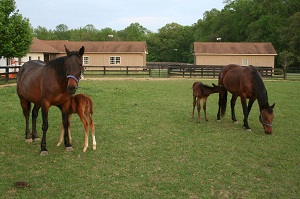 In our last newsletter we featured an article entitled Introducing a Nurse Mare to an Orphaned Foal. We discussed where you may look to find a nurse mare should you find yourself with an orphaned foal and how to go about introducing them to one another. However, there is an alternative option to a nurse mare which was not covered in this article, grafting a foal onto a recipient mare which has been induced into lactating. It just so happened that a week after our last newsletter was sent out we were faced with finding a nurse mare for two orphaned foals (pictured left with their new moms) which were admitted to our mare services division. We wish to highlight our recent success stories and share this alternative option with you.
In our last newsletter we featured an article entitled Introducing a Nurse Mare to an Orphaned Foal. We discussed where you may look to find a nurse mare should you find yourself with an orphaned foal and how to go about introducing them to one another. However, there is an alternative option to a nurse mare which was not covered in this article, grafting a foal onto a recipient mare which has been induced into lactating. It just so happened that a week after our last newsletter was sent out we were faced with finding a nurse mare for two orphaned foals (pictured left with their new moms) which were admitted to our mare services division. We wish to highlight our recent success stories and share this alternative option with you.
Introducing A Nurse Mare to an Orphaned Foal
March 31, 2016
Posted by
SBS in
Foal and Neonate Care
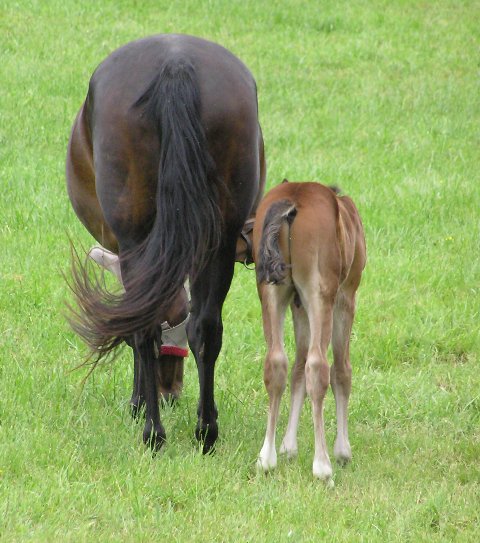 The arrival of a foal is always an exciting time regardless of whether you have a large breeding farm or just one mare to foal out. What happens when an emergency arises and you find yourself with a very young orphan foal that needs milk? Problems that may arise include: the mare dies during or soon after foaling, the mare colics or has other health issues which require emergency intervention, the mare rejects the foal, and/or the mare does not produce enough milk or “dries up.” There is always the option of bottle feeding these foals but this is a very time consuming process and the foal could tend to be more socialized towards humans than horses. These unfortunate circumstances are the perfect time to consider a nurse mare who can be brought in to adopt and raise the orphaned foal.
The arrival of a foal is always an exciting time regardless of whether you have a large breeding farm or just one mare to foal out. What happens when an emergency arises and you find yourself with a very young orphan foal that needs milk? Problems that may arise include: the mare dies during or soon after foaling, the mare colics or has other health issues which require emergency intervention, the mare rejects the foal, and/or the mare does not produce enough milk or “dries up.” There is always the option of bottle feeding these foals but this is a very time consuming process and the foal could tend to be more socialized towards humans than horses. These unfortunate circumstances are the perfect time to consider a nurse mare who can be brought in to adopt and raise the orphaned foal.
The Abnormal Foaling...What Can Go Wrong?
February 25, 2016
Posted by
Dr. Richard Giacopuzzi in
Foal and Neonate Care
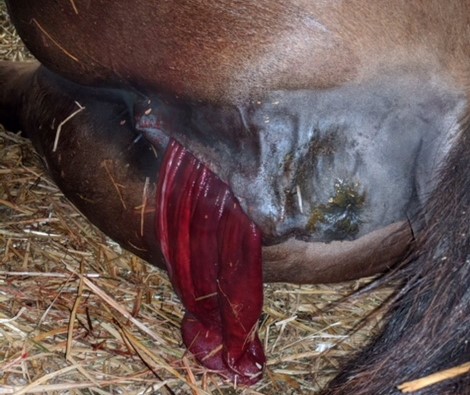 You bred your mare almost a year ago, 340 days to be exact, and have been waiting patiently. You have given her all of her pre-foaling vaccinations, adjusted her diet, and prepared a warm, well bedded stall. Everything is just right! So what can possibly go wrong? Well, most likely nothing. Mares foal uneventfully about 90% of the time, but when things do go south, they do so very quickly. So every mare owner needs to be prepared for the potential circumstance when things do go wrong.
You bred your mare almost a year ago, 340 days to be exact, and have been waiting patiently. You have given her all of her pre-foaling vaccinations, adjusted her diet, and prepared a warm, well bedded stall. Everything is just right! So what can possibly go wrong? Well, most likely nothing. Mares foal uneventfully about 90% of the time, but when things do go south, they do so very quickly. So every mare owner needs to be prepared for the potential circumstance when things do go wrong.
Preparing for Foaling Season
January 30, 2016
Posted by
SBS in
Foal and Neonate Care
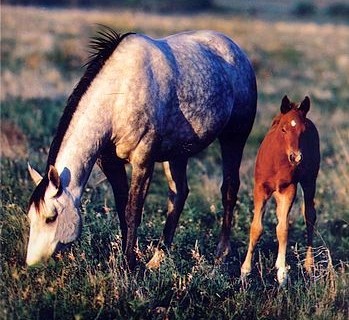 It comes around the same time every year…Foaling Season! Nearly one year ago you bred your mare. Ever since the 14-day pregnancy check you have anxiously awaited the arrival of your new foal. Our library of news and blog articles can be a great resource for the new or experienced breeder, whether you have one mare or stallion, or manage the operations of a larger breeding farm. Here we will review our articles which encompass pregnant and foaling mares as well as foaling and foal care. We cover the topics of breeding mares and stallions as well as their nutritional considerations in Are You Ready for Breeding Season.
It comes around the same time every year…Foaling Season! Nearly one year ago you bred your mare. Ever since the 14-day pregnancy check you have anxiously awaited the arrival of your new foal. Our library of news and blog articles can be a great resource for the new or experienced breeder, whether you have one mare or stallion, or manage the operations of a larger breeding farm. Here we will review our articles which encompass pregnant and foaling mares as well as foaling and foal care. We cover the topics of breeding mares and stallions as well as their nutritional considerations in Are You Ready for Breeding Season.
Why Colostrum Transfer is Critical to a Foal's First Weeks of Life
March 29, 2015
Posted by
SBS in
Foal and Neonate Care
Foaling season is officially upon us and right about now equine veterinarians have little else on the brain but colostrum. That’s how important colostrum is to a newborn foal; it can literally mean the difference between life and death. In this article the members of FullBucket, a company providing veterinary strength supplements for horses and dogs, discuss the foal's immune system, why colostrum is such an important factor in the their first hours of life, and what you can do to ensure their life starts right.
Product Review - Foaling Alarms and Mare Milk Test Kits
January 03, 2015
Posted by
SBS in
Foal and Neonate Care
 The weeks and days leading up to foaling can be exciting and stressful, filled with sleepless nights and middle of the night trips to the barn. Several technologies exist to assist in predicting when parturition is eminent. These devices, which include foaling monitors and milk test kits, may help take some of the anxiety out of the situation.
The weeks and days leading up to foaling can be exciting and stressful, filled with sleepless nights and middle of the night trips to the barn. Several technologies exist to assist in predicting when parturition is eminent. These devices, which include foaling monitors and milk test kits, may help take some of the anxiety out of the situation.
Foal Diarrhea - Avoiding it Altogether
February 05, 2014
Posted by
Dr. Robert Franklin in
Foal and Neonate Care
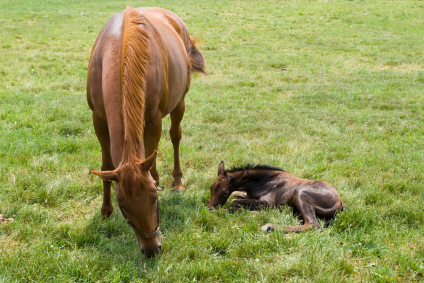 A newborn foal’s biggest adversary is infection from pathogens such as Rotavirus, E. coli and Salmonella bacteria. In fact, diarrhea or sepsis (generalized body infection) is the leading cause of neonatal intensive care in foals. The illness starts out as invasion by one of many viruses or bacteria. Rotavirus is highly contagious and happens when foals ingest focally contaminated material or lick surfaces contaminated with manure. One teaspoon of Rotavirus-infected feces from a foal can contain more than 10 million virus particles – enough to infect whole herds of foals. Unfortunately, too, the virus is so hardy that it can survive more than nine months at room temperature and over winter on farms.
A newborn foal’s biggest adversary is infection from pathogens such as Rotavirus, E. coli and Salmonella bacteria. In fact, diarrhea or sepsis (generalized body infection) is the leading cause of neonatal intensive care in foals. The illness starts out as invasion by one of many viruses or bacteria. Rotavirus is highly contagious and happens when foals ingest focally contaminated material or lick surfaces contaminated with manure. One teaspoon of Rotavirus-infected feces from a foal can contain more than 10 million virus particles – enough to infect whole herds of foals. Unfortunately, too, the virus is so hardy that it can survive more than nine months at room temperature and over winter on farms.
Care of the Weanling Foal
October 22, 2013
Posted by
Dr. Dave Scofield in
Foal and Neonate Care
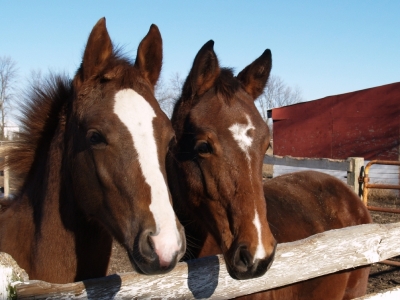 There are many milestones in the life of a foal. They start as big ones like standing, nursing, and meeting their dam for the first time. Yet as a foal ages and summer days begin to lengthen one major milestone looms over the foal…Weaning Day. From the perspective of a veterinarian, Dr. David Scofield walks us through the important aspects of weaning.
There are many milestones in the life of a foal. They start as big ones like standing, nursing, and meeting their dam for the first time. Yet as a foal ages and summer days begin to lengthen one major milestone looms over the foal…Weaning Day. From the perspective of a veterinarian, Dr. David Scofield walks us through the important aspects of weaning.
How to Prepare for Foaling Season
February 19, 2013
Posted by
SBS in
Foal and Neonate Care
 When your mare has made it to 320 days of pregnancy you are in the home stretch and will soon be the proud owner of a newborn foal. Are you ready? While labor and delivery are certainly a significant event, generally all will go off without a hitch and more likely than not, you will need only to be a quiet spectator. It is usually best to allow the mare’s natural instinct and abilities handle the delivery. However, your presence is important in the event of trouble or an emergency so you can call your veterinarian for assistance if it appears your mare is in distress during her foaling. Being knowledgeable of normal labor and delivery will allow for quick action and recognition if abnormal events should occur. There are also a few things to keep in mind in the weeks leading up to her due date that will aid in making for a safe and memorable foaling for you and your equine companions. In this article, we review pre-foaling plans and provide a supply list for your foaling kit.
When your mare has made it to 320 days of pregnancy you are in the home stretch and will soon be the proud owner of a newborn foal. Are you ready? While labor and delivery are certainly a significant event, generally all will go off without a hitch and more likely than not, you will need only to be a quiet spectator. It is usually best to allow the mare’s natural instinct and abilities handle the delivery. However, your presence is important in the event of trouble or an emergency so you can call your veterinarian for assistance if it appears your mare is in distress during her foaling. Being knowledgeable of normal labor and delivery will allow for quick action and recognition if abnormal events should occur. There are also a few things to keep in mind in the weeks leading up to her due date that will aid in making for a safe and memorable foaling for you and your equine companions. In this article, we review pre-foaling plans and provide a supply list for your foaling kit.
 Congenital Hypothyroidism is a disease syndrome or process that is native to the Northwest Region of the United States. Dr. Jed McKinlay of McKinlay & Peters Equine Hospital in Colbert, WA wishes for us to share their firsthand knowledge about this issue because there is little documentation to be found. Though it has been observed in the field, it has never been repeated in clinical research. However, a number of risk factors have been identified; dos and don’ts to evade this problem. (Warning! An image in this article may be disturbing to some readers.)
Congenital Hypothyroidism is a disease syndrome or process that is native to the Northwest Region of the United States. Dr. Jed McKinlay of McKinlay & Peters Equine Hospital in Colbert, WA wishes for us to share their firsthand knowledge about this issue because there is little documentation to be found. Though it has been observed in the field, it has never been repeated in clinical research. However, a number of risk factors have been identified; dos and don’ts to evade this problem. (Warning! An image in this article may be disturbing to some readers.) What transpires in the first 24 to 48 hours of a foal’s life is critical to his health and well-being from early life and up through weaning. As a foaling attendant there are several “milestones” to keep in mind as you watch the behavior of both the baby and the mare post-foaling. In this article we discuss the milestones they both should make within the few hours after the foal’s arrival into his new world. The care delivered, attention to detail, and respect for the nature of the horse will help set up your foal up for a healthier adolescence.
What transpires in the first 24 to 48 hours of a foal’s life is critical to his health and well-being from early life and up through weaning. As a foaling attendant there are several “milestones” to keep in mind as you watch the behavior of both the baby and the mare post-foaling. In this article we discuss the milestones they both should make within the few hours after the foal’s arrival into his new world. The care delivered, attention to detail, and respect for the nature of the horse will help set up your foal up for a healthier adolescence. What will you do in the event you are left to manage an orphaned foal? No one wants to think about such a scenario but it's best to consider all possible outcomes so you are prepared if the unthinkable happens. This includes knowing how to provide the orphaned foal with colostrum, locate a nurse mare, etc.
What will you do in the event you are left to manage an orphaned foal? No one wants to think about such a scenario but it's best to consider all possible outcomes so you are prepared if the unthinkable happens. This includes knowing how to provide the orphaned foal with colostrum, locate a nurse mare, etc.  You bred your mare almost a year ago, 340 days to be exact, and have been waiting patiently. You have given her all of her pre-foaling vaccinations, adjusted her diet, and prepared a warm, well bedded stall. Everything is just right! So what can possibly go wrong? Well, most likely nothing. Mares foal uneventfully about 90% of the time, but when things do go south, they do so very quickly. So every mare owner needs to be prepared for the potential circumstance when things do go wrong.
You bred your mare almost a year ago, 340 days to be exact, and have been waiting patiently. You have given her all of her pre-foaling vaccinations, adjusted her diet, and prepared a warm, well bedded stall. Everything is just right! So what can possibly go wrong? Well, most likely nothing. Mares foal uneventfully about 90% of the time, but when things do go south, they do so very quickly. So every mare owner needs to be prepared for the potential circumstance when things do go wrong. It comes around the same time every year…Foaling Season! Nearly one year ago you bred your mare. Ever since the 14-day pregnancy check you have anxiously awaited the arrival of your new foal. Our library of news and blog articles can be a great resource for the new or experienced breeder, whether you have one mare or stallion, or manage the operations of a larger breeding farm. Here we will review our articles which encompass pregnant and foaling mares as well as foaling and foal care. We cover the topics of breeding mares and stallions as well as their nutritional considerations in
It comes around the same time every year…Foaling Season! Nearly one year ago you bred your mare. Ever since the 14-day pregnancy check you have anxiously awaited the arrival of your new foal. Our library of news and blog articles can be a great resource for the new or experienced breeder, whether you have one mare or stallion, or manage the operations of a larger breeding farm. Here we will review our articles which encompass pregnant and foaling mares as well as foaling and foal care. We cover the topics of breeding mares and stallions as well as their nutritional considerations in  The weeks and days leading up to foaling can be exciting and stressful, filled with sleepless nights and middle of the night trips to the barn. Several technologies exist to assist in predicting when parturition is eminent. These devices, which include foaling monitors and milk test kits, may help take some of the anxiety out of the situation.
The weeks and days leading up to foaling can be exciting and stressful, filled with sleepless nights and middle of the night trips to the barn. Several technologies exist to assist in predicting when parturition is eminent. These devices, which include foaling monitors and milk test kits, may help take some of the anxiety out of the situation. A newborn foal’s biggest adversary is infection from pathogens such as Rotavirus, E. coli and Salmonella bacteria. In fact, diarrhea or sepsis (generalized body infection) is the leading cause of neonatal intensive care in foals. The illness starts out as invasion by one of many viruses or bacteria. Rotavirus is highly contagious and happens when foals ingest focally contaminated material or lick surfaces contaminated with manure. One teaspoon of Rotavirus-infected feces from a foal can contain more than 10 million virus particles – enough to infect whole herds of foals. Unfortunately, too, the virus is so hardy that it can survive more than nine months at room temperature and over winter on farms.
A newborn foal’s biggest adversary is infection from pathogens such as Rotavirus, E. coli and Salmonella bacteria. In fact, diarrhea or sepsis (generalized body infection) is the leading cause of neonatal intensive care in foals. The illness starts out as invasion by one of many viruses or bacteria. Rotavirus is highly contagious and happens when foals ingest focally contaminated material or lick surfaces contaminated with manure. One teaspoon of Rotavirus-infected feces from a foal can contain more than 10 million virus particles – enough to infect whole herds of foals. Unfortunately, too, the virus is so hardy that it can survive more than nine months at room temperature and over winter on farms.  There are many milestones in the life of a foal. They start as big ones like standing, nursing, and meeting their dam for the first time. Yet as a foal ages and summer days begin to lengthen one major milestone looms over the foal…Weaning Day. From the perspective of a veterinarian, Dr. David Scofield walks us through the important aspects of weaning.
There are many milestones in the life of a foal. They start as big ones like standing, nursing, and meeting their dam for the first time. Yet as a foal ages and summer days begin to lengthen one major milestone looms over the foal…Weaning Day. From the perspective of a veterinarian, Dr. David Scofield walks us through the important aspects of weaning.
